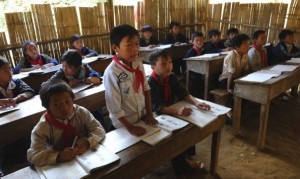ON SATURDAY morning, December 14th, America’s secretary of state, John Kerry, will travel to Vietnam. One of his talking points, according to the State Department, will be the “empowering role of education”. But it seems like Vietnam has already taken the message.
On December 3rd, the OECD released the results from its Programme for International Student Assessment (PISA), an exam administered every three years to 15- and 16-year-olds in dozens of countries. Vietnam recently joined the test for the first time, and it scored remarkably well—higher in maths than America and Britain, though not as high as Shanghai or Singapore. Nguyen Vinh Hien, a deputy minister for education, characterised Vietnam’s overall 17th-place ranking out of 65 countries and economies as a pleasant “surprise.”
The PISA scores, as they are known, measured how a half-million students from randomly selected schools answered written and multiple-choice questions in a two-hour test. Mathematics was the primary focus, but students were also evaluated on reading, science and problem-solving. Coverage of the scores by the Western news media suggested that the impressive maths performance by Vietnam, where per-capita GDP is only about $1,600, was perhaps a bit humbling for education officials in Washington, London and other self-regarding world capitals.
What explains Vietnam’s good score? Christian Bodewig of the World Bank says it reflects, among other positive things, years of investment in education by the government and a “high degree of professionalism and discipline in classrooms across the country”. But Mr Bodewig adds that the score may be impressive in part because so many poor and disadvantaged Vietnamese students drop out of school. The World Bank reports that in 2010 the gross enrolment rate at upper-secondary schools in Vietnam was just 65%, compared with 89% and 98% in America and Britain, respectively. South Korea’s rate was 95%.
A chorus of Vietnamese education specialists say that Vietnam’s PISA score does not fully reflect the reality of its education system, which is hamstrung by a national curriculum that encourages rote memorisation over critical thinking and creative problem-solving. “Every child in this country learns the same thing,” and nationwide tests merely reinforce the intellectual homogeneity that results, in the lament of To Kim Lien, the director of the Centre for Education and Development, a Vietnamese non-profit in Hanoi. Ms Lien reckons that instead of catalysing educational reform, the score might provide a convenient excuse for complacency in matters of policy. And the old-fashioned, inward-looking Ministry of Education and Training, she adds, is a past master at complacency.
Another systemic problem is a general lack of “integrity” in Vietnam’s education sector, in the words of Nguyen Thi Kieu Vien of the Global Transparency Education Network, a new initiative of Transparency International, a watchdog based in Berlin. In a recent survey the organisation found that 49% of Vietnamese respondents perceived their education sector to be “corrupt” or “highly corrupt”. The percentage was higher than that found in Thailand, Malaysia, Indonesia and Cambodia. Corruption is plainly evident at elite Vietnamese schools, where slots for pupils are routinely sold for $3,000 each. Yet it also exists on a smaller scale, in subtler forms. Many Vietnamese teachers hold extra tuitions, outside of regular school hours, for a small fee of between $2.50 and $5 per lesson. Not all parents can afford to pay these fees, and so the practice tends to exacerbate inequality.
In November some top-ranking national officials passed a resolution calling for reform in the education sector. Kim Ngoc Minh, an education researcher in Hanoi, says the resolution is the most comprehensive and ambitious in a generation. Other education specialists however wonder whether the resolution, which calls for reform in broad stokes, will translate into actual policy changes.
Actual changes are badly needed. In 2008, researchers from Harvard reported that Vietnam’s higher-education system was in “crisis”, and that it lagged far behind the systems of Thailand, Malaysia and the Philippines, to say nothing of those in China, Taiwan and South Korea. As a warning, they pointed to the comparative lack of articles published by Vietnamese researchers in peer-reviewed international journals. The Harvard memo also said the government was awarding research funding “uncompetitively”, and that there was a vast difference between what graduates had learned and what prospective employers wanted them to know.
These shortcomings can be linked to others in primary and secondary schools. Ms Lien of the Centre for Education and Development says that a basic reform package might begin with the younger age group, by including parents in a decision-making process that has long been dominated by the education ministry. Nearly two years ago, she was among a dozen senior educators who submitted paperwork to the ministry requesting permission to establish a national parent-teacher association. Their group still has not received an official response. Perhaps the ministry is afraid of what Vietnamese parents might say, if they had a platform.
(Picture credit: AFP)
Source: https://www.economist.com/blogs/banyan/2013/12/education-vietnam




